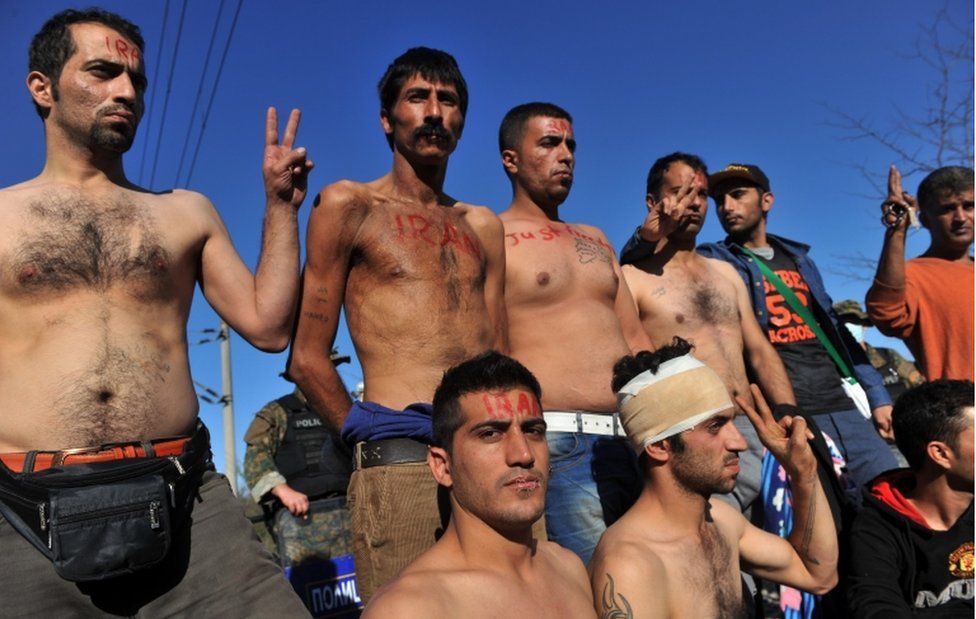Migrant crisis: 'Iranians' sew lips shut in border protest
- Published

Migrants stuck on the border between Greece and Macedonia sewed their lips together to protest against not being allowed to continue their journey.
About six men, apparently from Iran, stripped down during the demonstration near the village of Eidomeni.
Hundreds of migrants have been protesting after Macedonia limited passage to only those fleeing conflict.
Europe's border controls have come under renewed scrutiny since the attacks in Paris on 13 November.
Balkan countries said last week they would only open their borders to people fleeing countries affected by war such as Syria, Iraq and Afghanistan.
Migrants hoping to travel through Europe must prove they come from Syria, Iraq or Afghanistan to be let through the border with Macedonia
The restrictions came after a forged Syrian passport was found next to the body of one of the perpetrators involved in the Islamic State attacks in the French capital.
The latest action by migrants stranded on the Greece-Macedonia border follows days of protests.
The men - some of whom appear to be from Iran's Kurdish minority - sewed their mouths shut, scrawled messages such as "Just freedom" on their foreheads and chests, and sat down on railway tracks in front of riot police.
Men from Bangladesh and Morocco also joined the protests after they too were deemed "economic migrants" and denied passage.
Hundreds of thousands of migrants, many of them Syrians fleeing war, have made the perilous journey through the Balkans after arriving in Europe by boat in Greece from Turkey.
Most head for the more affluent countries of northern and western Europe, mainly Germany and Sweden.
German federal police said on Monday that the number of asylum seekers arriving in the country in November was expected to exceed the previous monthly high recorded in October.
They said some 180,000 asylum seekers had already entered the country so far this month - compared with 181,000 in the whole of the previous month.
Meanwhile the numbers crossing from Greece into Macedonia fell on Monday amid the new restrictions, according to the Associated Press.
More on the Paris attacks
Around 2,900 people crossed into Macedonia in the 24 hours before 0600 (local time) on Monday, down from more than 6,000 on the previous day, the news agency quoted local police as saying.
The move by Macedonia, Serbia, Slovenia and Croatia to impose stricter entry criteria left thousands stranded and sparked human rights concerns.
The Iranian government has disproportionately targeted the country's Sunni, ethnic Kurdish minority with arbitrary arrest, prolonged detention, and physical abuse, according to the US state department.
The EU's Schengen agreement, which allows passport-free travel between 26 European nations, has come under increased strain since the attacks in Paris.
Right-wing European politicians called for border closures following indications that one of the suicide bombers at the Stade de France had crossed into Greece using a fake passport.
A note on terminology: The BBC uses the term migrant to refer to all people on the move who have yet to complete the legal process of claiming asylum. This group includes people fleeing war-torn countries such as Syria, who are likely to be granted refugee status, as well as people who are seeking jobs and better lives, who governments are likely to rule are economic migrants.
- Published23 November 2015
- Published20 November 2015
- Published18 November 2015
- Published4 March 2016